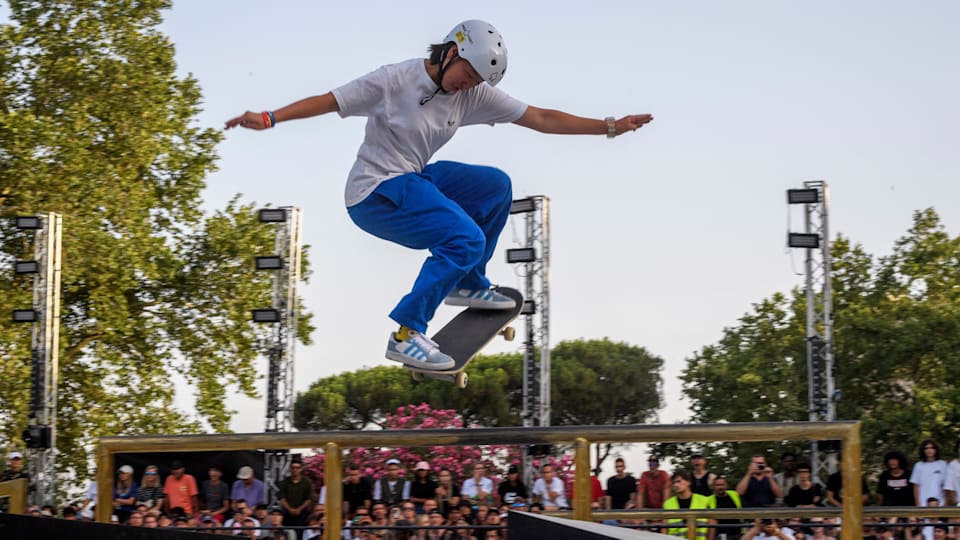Tony Hawk on the state of progression in skateboarding: "We're going to keep raising the bar"
As skateboarding approaches its second Olympic appearance at Paris 2024, Olympics.com speaks to a legend of the sport on some of the ways it has evolved since Tokyo 2020 in 2021, and if it is treading new ground.

Progress.
That's the constant pursuit for most skateboarders.
From first mastering balance to landing an ollie, which acts as a gateway to a whole new realm of tricks; skateboarding lures its participants into wanting more and more.
Since its inclusion in the Olympic Games, skateboarding – once a fringe counter-cultural movement – has become increasingly more mainstream. The global feel of the Olympic qualifiers for Paris 2024 reveals the extent it has conquered the world, and the upward thrust by unknown newcomers is evidence of its accessibility.
But what, if anything, has Olympic inclusion and global spread done for the progression of the sport?
How, if at all, has it evolved?
“I think that skating has finally come of age,” Tony Hawk said in an interview with Laureus for Olympics.com. “There is parity and equality, and it's something that's long overdue.
“If you look at skateboarding, the state of skateboarding, now, if you just go to a skate park, it's probably very crowded. There are people of all genders, people of all ages, of all backgrounds, races, and they're all enjoying it together. And I can't think of any other sport that truly is inclusive like that.
He continued: “Yes, it was more male-dominated in the past, maybe 20 years ago, even 10 years ago, but all that's changed and much for the better.”
"I felt that same drive"
One of the prevailing themes that has emerged from the Olympic cycle between Tokyo and Paris has been the ascent of women’s skating, and not just in quality.
A total of 67 women made up the initial Olympic World Skateboarding Ranking for street at the start of the qualification journey for Tokyo 2020, compared to 138 men. Now, at the end of phase one of qualification for Paris 2024, 130 female street skaters are in the official ranking, compared to 298 men.
Complete equality is still some way off, but the growth of the women’s field is immediately obvious. And where female skaters have broken new ground, their efforts have been widely recognised.
Park skateboarder Arisa Trew last year became the first female skater to land a 720 in competition, a feat first achieved by Hawk.
In addition to making headlines for her remarkable exploit, Trew was crowned an award winner. At the 2024 Laureus World Sports Awards, the 14-year-old was named action sportsperson of the year; becoming the first female skater to win the prize.
Hawk, whose ‘Vert Alert’ event Trew achieved the feat at, opened up about what it meant to see the young Aussie land the trick:
“When I saw Arisa start trying 720s and getting close to making her first one ever, I identified with it greatly. I mean, I learned that trick in 1985 on my own on a ramp in Sweden with two people watching me. But I felt the same drive. I felt the same passion that I wanted to get this thing done; just for me personally. And you could see that in her eyes.”
Arisa Trew on the Laureus World Sports Awards red carpet in Madrid.
"We're going to keep raising the bar"
While there was a prize to win and a hyped-up crowd watching, Hawk maintains that none of that was what motivated Trew; the pure passion to progress that saw her bring the trick home.
“She wasn't doing it for the crowd. She wasn't doing it for the medal. She was doing it because it was something that just drove her. And it was propelling, and she had to get it done.”
Is Trew’s achievement a sign of progress? An indicator that more is to come from those already at the top pushing the boundaries?
Hawk certainly thinks so.
“I feel like her breakthrough is a breakthrough for women skaters in general. I mean, it's not an anomaly. She does a 720 and she did it in competition for the first time. It was a milestone. And it's a bar that's been set,” the legendary skater says.
“It's not something that everyone's going to aspire to. This is the top level. This is where we're at now. And we're going to keep raising the bar.”
The arrival of the Yutornado in contests
Trew’s 720 is one example of progression, but it isn’t the only one.
Innovation, a cornerstone of skating, is another type and we have also witnessed it in the run-up to Paris.
At an Olympic qualifier in Lausanne, last year, Olympic men's champion Horigome Yuto graced the world with his stunning nollie backside 270 nose slide 270 out trick, also known as, the 'Yutotornado'.
The Japanese skater, who had debuted the trick in competition for the first time one month before, delivered it in Switzerland with his typically cold style and was rewarded with a 96.95 from the judges – then the highest score ever to be awarded for a single trick at an Olympic qualifier.
The crowd watching on, sensing they had seen something special as the Japanese skater almost impossibly whipped around like a hurricane, rose to their feet in awe. Horigome even cracked a smile to celebrate its landing.
It was a moment for the record books, and has been recognised as such, but the pioneering contest trick's contribution to skateboarding's progression doesn't end there.
In dropping the Yutornado twice in two months Horigome had thrown the gauntlet down, and most recently, it was world champion and fellow Japanese Shirai Sora who responded.
At the last qualifying stop of phase one in Dubai, the world number one ranked skater topped Horigome’s qualifying-leading trick score after earning a 97.07 for a remarkable cab sugarcane down the rail in the final.
It's not simply at the moment the trick lands that progress is made; it's in the minds of skaters looking to challenge too.
"There is such good skateboarding everywhere"
Given that core skateboarding happens away from the burning spotlight of broadcast cameras and arena lights, what goes down in the streets and skateparks means knowing the true pace of progress in skateboarding is nearly impossible.
"There's so much skateboarding that's going on in the streets that maybe you follow some of these guys or maybe you went down the rabbit hole and you found their videos, but there is such good skateboarding everywhere," Canada's Micky Papa told Olympics.com when asked for his thoughts on the current rate of progress in skating.
That we might never truly know arguably makes the endeavour to find out all the more fascinating. Certainly, on the contest level, skateboarding does appear to be evolving rapidly and in different ways.
From innovation to gender parity, skateboarding is growing and the world is watching evermore closely.
And with the high-stakes, high-energy Olympic Qualifier Series on its way, and the Olympics soon after, the pressure to perform at the top level might promise even more growth as skaters look to make the mark.
All that’s left is to wait and see where it goes next.

